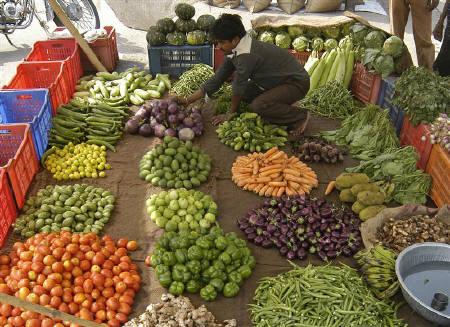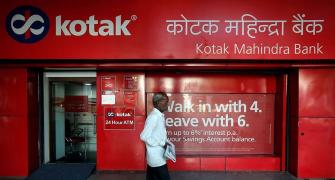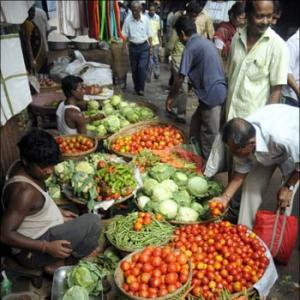Under attack for inability to control surging food prices, especially onions, Finance Minister Pranab Mukherjee has written a letter to state chief ministers asking them to crack down on hoarders to ensure increase in supply of essential items. "The Finance Minister has written a letter to all state chief ministers to crack down on hoarders for removing supply bottlenecks and has sought their help in controlling inflation," a key source said.
"The Finance Minister has written a letter to all state chief ministers to crack down on hoarders for removing supply bottlenecks and has sought their help in controlling inflation," a key source said.
Yesterday, Mukherjee had said the state governments need to ensure that all bottlenecks in the supply chain are removed so that food prices can be brought down quickly.
Food inflation climbed nearly to a year's high of 18.32 per cent on December 25, due to spurt in prices of onions among other vegetables besides milk.
The wholesale food inflation jumped by 3.88 percentage points from 14.44 per cent in the previous week ending December 18, 2010, taking the government by surprise.
The extent of high food inflation could be gauged from the fact that the rate of price rise last year at this point of time was almost 20 per cent.
It means that food inflation now is 18.32 per cent over 20 per cent last year.
The damage to onion crops in parts of Maharashtra due to unseasonal rains had led to short supply, as its prices skyrocketed to Rs 75-80 a kg in various retail shops in the country.
However, the Centre's move to ban onion exports and remove customs and countervailing duties on the vegetable led to some cooling of prices later.
Prices are now ruling at around Rs 45-50 a kg.
Meanwhile, Pakistan has refused to export onions to India, which may blunt the impact of removing customs and countervailing duties by the government here.
The further easing of onion prices depends on its imports from other countries as well as crackdown on hoarders, analysts said.
Chief economic advisor Kaushik Basu recently blamed cartels among traders for high onion prices.
He had said the movement of onions should be expedited to cool down its prices.
In fact, Home Minister P Chidambaram wondered recently if the government has all the tools to calm down food prices.
This implies that the Centre has to rely on cooperation of states to bring down prices of essential commodities.
The rising food prices have given ammunition to the opposition to corner the Government.
BJP spokesperson Shahnawaz Hussain said yesterday that the Congress-led government was not doing enough to tackle the crisis and it stood "exposed" in front of the people.
Meanwhile, a Finance Ministry statement said Mukherjee in his letter asked state governments to ensure that all bottlenecks in the supply chain are removed at the earliest and the availability of the food items causing inflation is improved so that their prices can be brought down quickly.
He requested the chief ministers to urgently look into the supply management of items that are driving the current round of food inflation in the economy.
Mukherjee asked them to particularly look into the local factors that are widening the gap between the wholesale and retail prices.
The Finance Minister said much of the food inflation, which stood at 18.32 per cent, has been due to significant increase in the prices of a few primary items (those found in the raw form) like fruits and vegetables, milk, meat, poultry, eggs and fish.
He also mentioned in his letter that the inflation data shows that three-fourth of food inflation is due to rising prices of vegetables.
On the other hand, nearly one-fourth of cereals and pulses prices have declined sharply and continue to do so even in the recent weeks when food inflation started rising.
There are some weather-induced supply constraints on some of the items currently exhibiting high inflation, which goes against the seasonal decline in prices normally seen at this time of the year, the letter said.
However, a larger part of price rise is due to the widening gap between the wholesale and retail prices and the growing demand for these products due to rising income levels, Mukherjee said.
The Finance Minister said that from a high of nearly 21 per cent for the week ended April 21, 2010, food inflation declined to 8.60 per cent for the week ended November 20 due to "our collective efforts".
This trend has reversed since then, he said.







